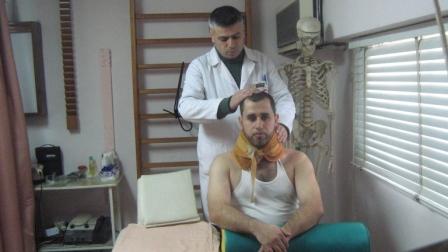
Palestine Red Crescent Society (PRCS) established “Al Ramlah Centre for Rehabilitation and Physiotherapy” in the mid-1970s under the banner “Rehabilitated persons at the service of the wounded”. Since its inception, the Centre, located in the Akka Medical Complex in Beirut, has received thousands of wounded and disabled persons as well as persons with special needs, both Lebanese and Palestinians. These patients were treated and physically and socially rehabilitated by experts and technicians working in the Center and in PRCS in general.
The increase in the number of wounded and disabled Palestinians due to wars and Israeli attacks prompted the creation of several specialized rehabilitation and physiotherapy centers in PRCS hospitals and health centers in Lebanon with support from Arab and international friendly institutions. This is how the “Physiotherapy Section” at Safad Hospital in Al Baddawi camp (Tripoli) was born at the beginning of 1993 in cooperation with the Palestinian Solidarity Association of Sweden (PGS), an NGO which provides urgent humanitarian services to Palestinians in Palestine and the Diaspora. PGS started working in Northern Lebanon at the end of the Lebanese civil war in 1991, focusing on the provision of health and rehabilitation services to the sick and the needy in the area.
The Section currently employs skillful and knowledgeable staff experienced in the treatment and rehabilitation of the sick and wounded from Nahr al Bared and Baddawi camps, as well as from all other areas and backgrounds. It provides its services to persons suffering from the following conditions: neck and disc problems, lower back pains, bone fractures (all types), disabilities, vertebral column problems and sports injuries. It also provides therapy before and after surgical operations as well as physiotherapeutic and rehabilitation-related advice. A “Stroke Branch” was also created to ensure patients’ follow-up and supervision through home visits, with special focus on teaching family members how to handle sick relatives with a view to improving their health conditions and to rehabilitating them both at home and in society. Home visits also include patients who undergo artificial hip/knee joint replacement operations and who cannot reach the hospital. These patients receive 3 home visits per week, free of charge. Assistive devices, such as canes, water mattresses and wheelchairs are provided to patients and the needy to help them overcome their disabilities.
Around 150-200 patients receive treatment at this Physiotherapy Section per month. Most of them suffer from neck, lower back and vertebral column pains. They are treated in line with a specific treatment program using state-of-the-art equipment.
Advocacy Group
One of the activities provided by the Section to persons with disability and chronic-disease patients is the “Advocacy Group”. It comprises many disabled persons and persons with special needs in nearby camps who are registered with the Palestinian Disability Forum (PDF). The Group seeks to employ them in its Cafeteria located at Safad Hospital’s main entrance in order to help them gain full autonomy.
In cooperation with the Hospital’s Management, the Section holds periodic meetings for the Advocacy Group in order to get better acquainted with its conditions, examine its members’ personal and general needs, and provide conducive conditions to help them. Moreover, training courses help the Group’s members achieve their material and moral goals, rehabilitate them and help integrate them within their families and society in general.
Other complementary activities
The Section cooperates with the Community-based Rehabilitation Center (CBR) to provide support and rehabilitation services to disabled children. CBR covers children’s basic needs and trains and rehabilitates them both physically and socially, according to a specific program which takes into account the children’s age groups as well as their mental and physical capacities. The Center follows-up on these children both at home and in their training centers.
The Center also organizes sports classes for women to protect them against back and neck pains, obesity and flabbiness. It also provides a special course for girls suffering from scoliosis. Workshops, health and educational lectures are held with special focus on persons working in gyms to prevent sports-related injuries which could lead to additional problems and even to disabilities.